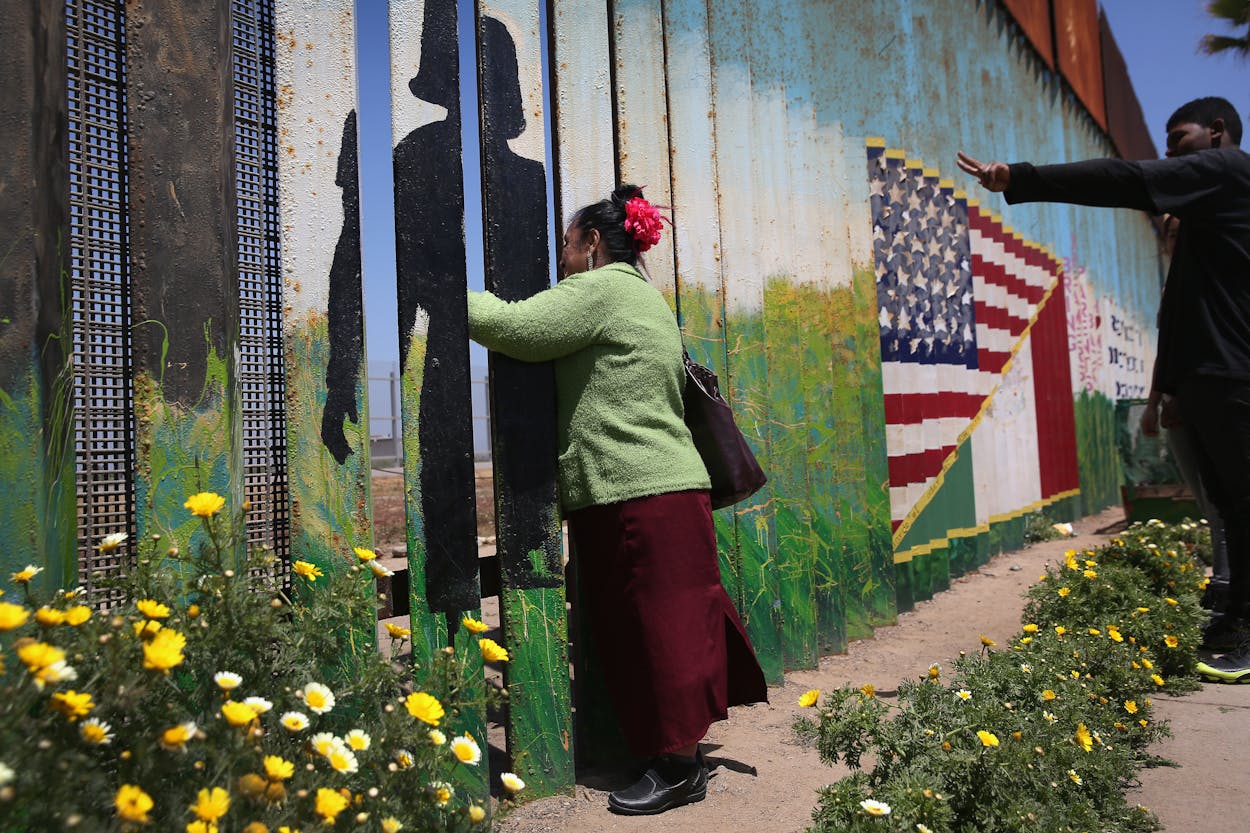The wall is one of the cornerstones of Donald Trump’s campaign, if not the sole consistency. “I will build a great, great wall on our southern border,” Trump proclaimed during his announcement speech in June 2015. Ever since he uttered those magical words, the wall has grown into a rallying cry for his supporters. When he mentioned it again during his Republican nomination acceptance speech last week, it was met with a chant of “build the wall, build the wall!” The plan has received criticism from both Democrats and other Republicans, who’ve called it racist and impractical, among other things. But perhaps the two most important groups who oppose building a wall on the U.S. border with Mexico are those who have the closest relationship to it: border town residents and border patrol agents.
The Dallas Morning News, Cronkite News, and Univision News partnered together to conduct a series of surveys in fourteen cities along both sides of the U.S. and Mexico border. Of the 1,427 residents asked whether they believed the U.S. should build a wall along the border, 65 percent of people on the U.S. side and 75 percent on the Mexico side voted “should definitely not.” Only 14 percent of residents in U.S. border towns and 5 percent of residents in their Mexico “sister cities” voted “definitely should.”
For residents living in these sister cities—El Paso and Ciudad Juarez; Del Rio and Ciudad Acuna; to name a couple—the majority of the residents view those living on the other side of the border positively. Thirty-eight percent of U.S. residents view people in their Mexican sister cities as neighbors, and 35 percent view them as “immigrants seeking a better life.”
Although crime and drugs ranked as a concern for residents, the majority of people on the border cited the economy as their biggest concern. Rather than reducing or hindering it with a wall, ease of movement, trade, and access between the two countries is an integral function of daily life in cities where residents cross the border for work and even basic things such as shopping. Residents expressed the belief that rhetoric that paints the border as lawless and dangerous is wildly out of touch with their realities. “I have more of a safety concern going to New York City than here,” Elizabeth MacTavish told the Dallas Morning News. “I think it’s just ridiculous.”
That residents of cities who have grown to depend on each other socially and economically don’t want a giant wall splitting them up might not come as a surprise to many. The opposition of Border Patrol agents to the wall is another story, especially considering that the National Border Patrol Council, the union that claims to represent 16,500 agents, officially endorsed Trump in March.
It’s not so much the neighborly and community aspect of the U.S. border with Mexico that makes some members of the National Border Patrol oppose Trump and his great wall. The union has been criticized by agents who say their endorsement of a candidate who’s called Mexican immigrants “rapists” and “criminals” can only “undermine trust” built between local agencies and the communities and immigrants they work with. And even among those agents who do support Trump, such Agent Chris Cabrera in Allen, the candidate—not the wall—is seen as more of a means to an end. According to Cabrera, Trump represents an administration that will hopefully make the necessary changes to increase security.
One of the reforms some agents are hoping for is the “catch-and-release program.” When border crossers are caught and processed, those who’ve crossed before or have a criminal background are given a “notice to appear” in court. Due to overwhelmed immigration judges, these court dates sometimes give immigrants years to live in the U.S., as long as they stay on the good side of the law. That’s how the process has worked throughout both the Bush and Obama administrations, and that’s exactly what agents like Cabrera want to see changed.
“If you continue to reward people by letting them into the country, they’re going to keep coming,” Cabrera told Politico. “If we don’t like these laws, we need to change them. We’re a nation of laws—and until we amend them or change them, we need to enforce them.”
And the wall? The union made no mention of it in their endorsement announcement, but Border Patrol agents along the Rio Grande Valley largely view it as waste of time and money that wouldn’t actually solve any of their security problems. Bush’s Secure Fence Act of 2006, which resulted in a fence along about a third of the U.S. and Mexico border, didn’t really go so well, after all. Construction on that project stopped after it proved to be more costly, challenging, and ineffective than anticipated. “We put up that 18-foot wall [in the 2000s], the next day they had 19-foot ladders. It’s not going to stop them, but it’ll slow them down,” Cabrera said.
Rather than a wall, agents are calling for better infrastructure, improved technology, and the recruitment of more agents. With 51 percent of U.S. border city residents voting “no” and 44 percent voting “yes” as to whether more agents are needed, residents and Border Patrol agents may not necessarily see eye-to-eye on everything the border needs. But at the very least, they both know a wall isn’t the solution Trump thinks it is.








